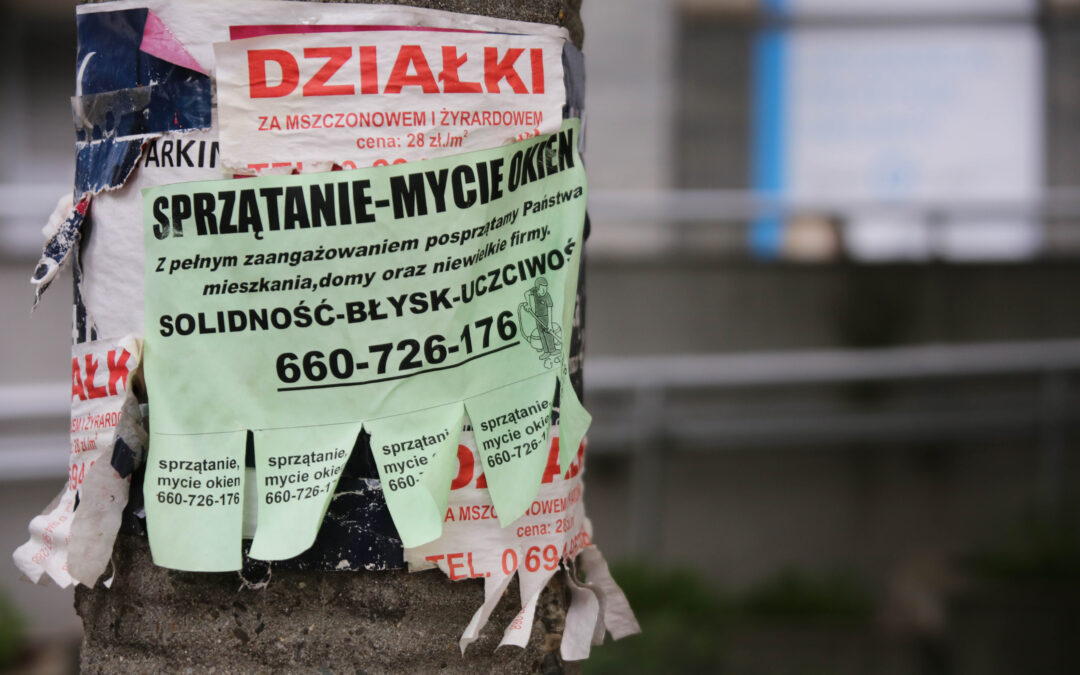Almost one in eight people (12%) in Poland who are working with an employment contract – around 1.4 million people in total – receive some of their wages off the books, according to a new report by the Polish Economic Institute (PIE), a think tank.
PIE notes that such “under the table” payments “distort competition in the market, putting honest businesses in a worse position to businesses engaging in unfair practices”, impact on workers’ rights, and reduce government revenue.
The analysis looks only at a subset of the grey economy, where workers who are hired on the basis of employment contracts receive payments on the side – in cash and not officially recorded – in addition to their contractual wages. PIE estimates the size of off-the-book payments by comparing the wage distribution for private businesses with that in the public sector, where it assumes no unofficial earnings, complemented by a survey of employers and workers.
The report found that around 6% of the total of 600 billion zloty paid as wages for contract workers in Poland was cash-in-hand, which amounted to around 1.6% of GDP in 2018.
As a result of a chunk of earnings being omitted from official statistics, estimates of the average monthly wage in Poland – 4,585 zloty (€1,000) in 2018 – may be undervalued by around 5%, or 240 zloty (€52).
Almost a third (31%) of workers at Polish micro-firms receive unofficial payments, according to PIE. The practice is less common in larger businesses – those with at least 10 employees – where only 11% of workers receive such payments.
The report’s authors explain that smaller businesses may be more predisposed to unrecorded payments because of a “less formal relationship” between employers and the people working for them, greater pressure to cut costs, and simpler accounting systems.
Low-earners, especially those earning near the minimum wage, are also more likely to be paid in cash. The practice is also more common with younger and less-educated workers, but there are no notable differences between men and women.
The sectors where informal payments were declaratively most popular included the restaurant and catering industry, hospitality and beauty, sales, and construction.
PIE notes that off-the-books payments can make workers “less willing to take advantage of their social rights”, such as sick leave, and reduces the money they set aside for retirement.
Such payments also cut government revenue by 17.3 billion zloty (€3.8 billion) in 2018, which is similar to the estimated VAT gap of 19 billion zloty.
The largest shortfall (of 6.6 billion zloty) resulted from lower retirement payments, followed by other social security (ZUS) contributions (5 billion zloty), income tax (3 billion zloty) and health insurance fees (2.6 billion zloty).
Poland’s Law and Justice (PiS) government has been praised for its efforts to close the VAT gap, which stood at 23.9% when the party came to power in 2015. In 2018, Poland achieved the third largest decline in its VAT gap among all EU countries, closing it by 4.3 percentage points.
Main image credit: Paul Sableman/Flickr (under CC BY 2.0)

Maria Wilczek is deputy editor of Notes from Poland. She is a regular writer for The Times, The Economist and Al Jazeera English, and has also featured in Foreign Policy, Politico Europe, The Spectator and Gazeta Wyborcza.




















